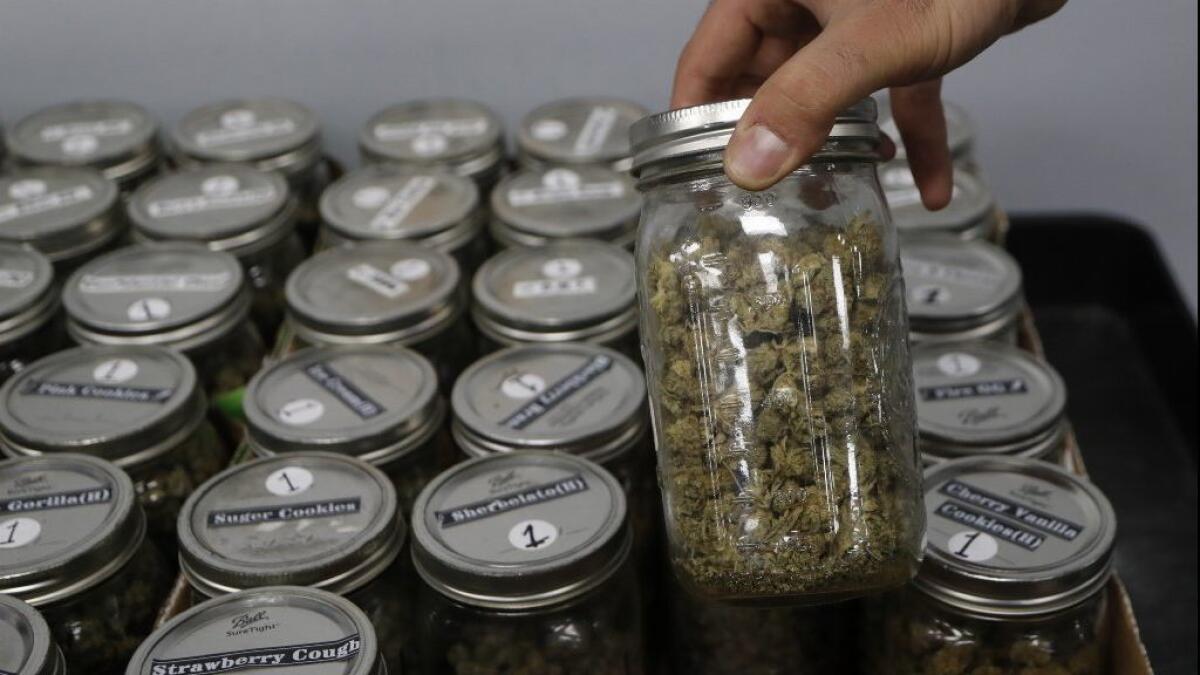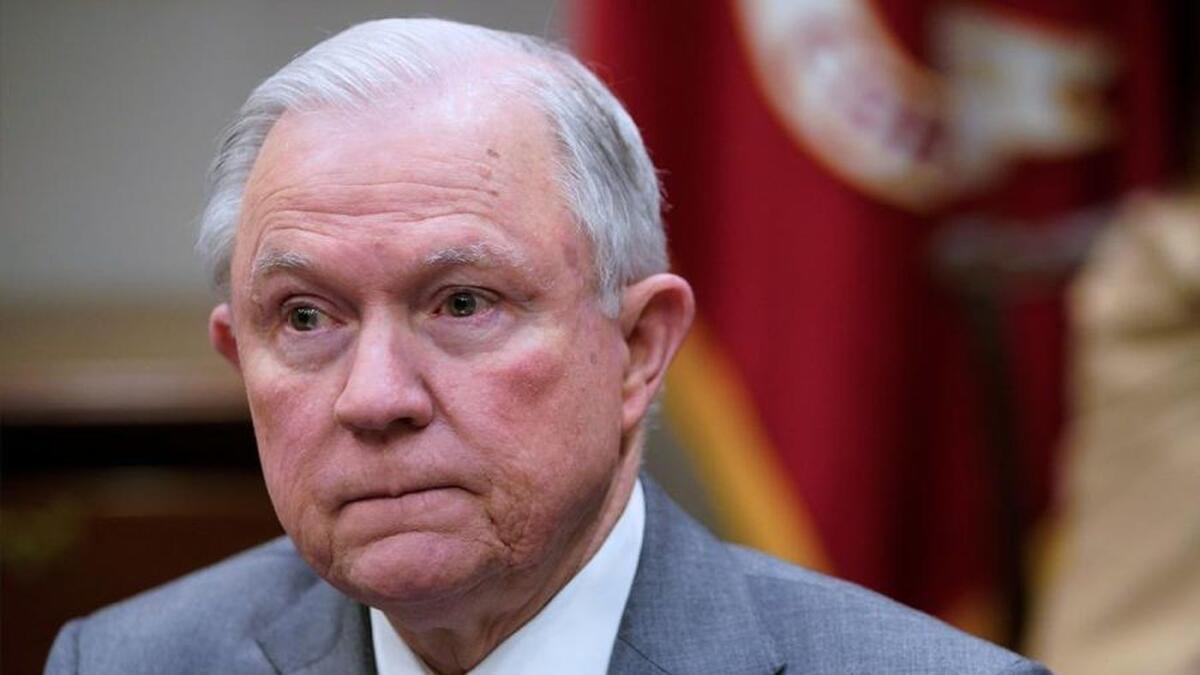Must Reads: With Jeff Sessions out at the Justice Dept., the marijuana movement exhales

- Share via
He described marijuana as a “very real danger” and has said its effects are “only slightly less awful” than those of heroin. Once, during a drug hearing when he was a Senator, he said he wanted to send a clear message: “Good people don’t smoke marijuana.”
So when Atty. Gen. Jeff Sessions was ousted recently, a collective sigh of relief rose up from proponents of legalized pot — activists, politicians, investors — who felt targeted by the nation’s top law enforcement officer.
Sessions’s departure has translated into spiking stocks for cannabis companies and a reset of sorts for the legalization movement which, since 2012, has seen nearly a dozen states pass recreational pot measures.
Colorado governor-elect Jared Polis, a staunch supporter of legal pot, said Sessions “had it out for states that have legalized marijuana.”
“No question about that,” Polis, a Democrat, said in an interview. “In an ideal situation, the next attorney general would recognize the rights of states, like Colorado, to responsibly legalize and regulate marijuana and not interfere or even threaten to interfere.”
Even Cory Gardner, a staunchly conservative Republican senator from Colorado, tweeted a subtle jab at Sessions after his departure: “I look forward to continuing to work with the president to fulfill his campaign position to leave the regulation of marijuana to the states.”
While it’s hard to know exactly what, if anything, acting Atty. Gen. Matthew Whitaker will do on the issue, activists are hopeful they’ve escaped the toughest scrutiny. Although he hasn’t spoken at length about his views on marijuana, Whitaker, during his 2014 candidacy for an Iowa Senate seat, sympathized with users of medical cannabis.
Ideally, the next attorney general would not only strip away the threat of federal interference, but also lay out guidelines for states with laws on the books, said Michael Collins, director of the Drug Policy Alliance, which advocates for marijuana legalization.
“The hope is that the next attorney general has drug policy ideas that are not straight out of the 1980s,” Collins said.
The markets reacted swiftly to Sessions’ resignation. Cannabis producer Tilray quickly saw its stock rise 31%, Canopy Growth’s stock jumped 8.2% and Cronos Group’s stock was up 8.4%.
Stuart Titus, CEO of Medical Marijuana, Inc. — one of the first publicly-traded cannabis companies in the U.S.— believes Sessions’ departure is a harbinger of good times for the industry.
“Sessions’ stance on cannabis had been a major impediment toward cannabis reform,” he said, “and now industry participants hold new hopes for sweeping change at the federal level.”

From the outset of his tenure as top cop, Sessions hardly shy about sharing his anti-marijuana stance.
Last year, he penned letters to governors of states with legalized pot explaining he had “serious concerns” about the effects of legalization and suggesting the states could face crackdowns from the Justice Department.
In his letters to three Democratic governors and the Independent governor of Alaska, Sessions cited recent reports on the impact of pot legalization, listing problems with security, distribution and the controlled use of marijuana in the four states.
“The Department remains committed to enforcing the Controlled Substance Act in a manner that efficiently applies our resources to address the most significant threats to public health and safety,” Sessions wrote.
While he didn’t take any concrete steps to curb the sale of legal pot, his threats continued.
In January, Sessions rescinded an Obama-era policy that directed federal prosecutors not to target marijuana businesses that operate legally under state law. Even so, in April, President Trump — who has remained neutral on the topic — assured lawmakers, including Gardner, that the federal government would not interfere with the will of states.
Colorado Gov. John Hickenlooper, a Democrat, who received a letter, said Sessions repeatedly ignored state constitutional amendments legalizing marijuana.
“He was a stubborn stickler for the status quo,” Hickenlooper said in an interview.
Mason Tvert, a spokesman for the Marijuana Policy Project, a group dedicated to ending marijuana prohibitions, said the turbulent talk from the head of the Justice Department has caused uneasiness in the industry.
“[Sessions’] rhetoric and some of his symbolic actions had significant financial consequences for the state-legal cannabis industry,” Tvert said. “Businesses were not shut down and operators were not arrested, but investments got pulled and deals went south, creating significant headaches.”
Despite Sessions’ stance, the legalization movement has forged ahead.
Voters in Michigan this month passed a ballot measure legalizing the sale and possession of up to an ounce of marijuana for anyone over the age of 21, joining nine other states with similar laws. In addition, conservative states like Utah and Missouri passed medical marijuana reforms this month. Thirty-two states currently allow medical pot.
Support for legalization remains high. A Pew Research Center survey from October showed 62% of Americans support legalized marijuana, compared with 34% who want it to remain illegal. Support is double what it was in 2000 when 31% believe pot should be legalized. Nearly seven-in-ten Democrats say it should be legal.
Even former Republican House Speaker John A. Boehner, who for years had opposed legal marijuana saying it was a gateway drug, has reversed his position and now supports it. He’s joined the board of Acreage Holdings as a paid advisor. The company has cannabis operations in several states, and Boehner is delivering speeches across the country touting legal pot.
Last year, Democrats introduced legislation aimed at ending federal prohibition on marijuana. So far, it’s stalled in Congress.
But that soon could change when Democrats take control of the House in January and with Sessions out at the Department of Justice, said Rep. Earl Blumenauer (D-Ore.), a staunch supporter of ending federal pot prohibition.
“Time and time again, he attempted to impose his own views on reforming our outdated marijuana laws, which did not match the majority of the American people,” he said of Sessions.
Blumenauer added: “It’s time to finally end the federal government’s policy of prohibition.”
Twitter: @kurtisalee
More to Read
Sign up for Essential California
The most important California stories and recommendations in your inbox every morning.
You may occasionally receive promotional content from the Los Angeles Times.











